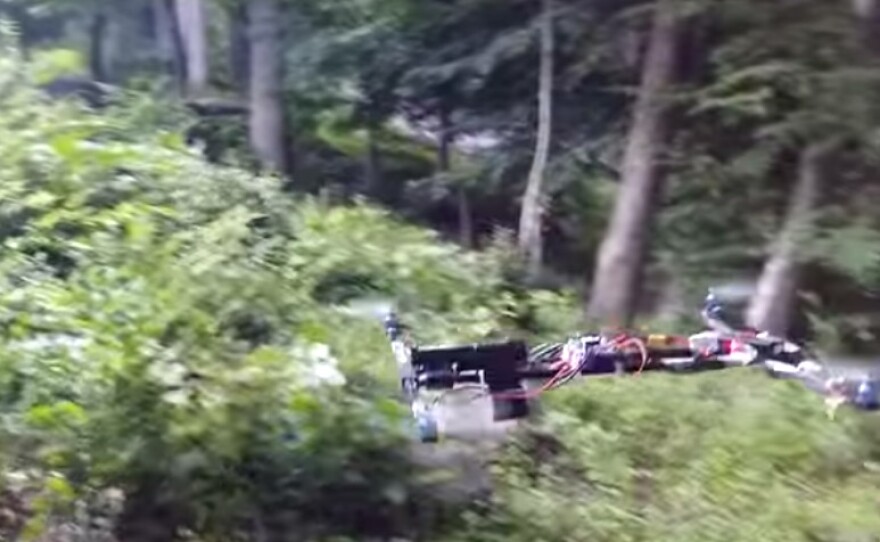There are no laws specifically prohibiting the use of weapons on drones in Connecticut.
A Connecticut man who videotaped a homemade "drone" flying and firing a handgun in Clinton is now the subject of an FAA investigation.
The 14-second video shows a small hovering flying machine. It's black with four spinning propellers and there's a semiautomatic handgun strapped on top. As it hovers, it fires four shots into a wooded area before the video cuts out.
The Associated Press said it was posted to YouTube by 18-year-old Austin Haughwout of Clinton. Last year he was involved in an incident with a woman on a Connecticut beach because he was flying a drone.
In a statement, the Federal Aviation Administration said it's investigating the YouTube video. The FAA hasn't said specifically whether or not it's illegal to put a gun on a drone -- only they're looking into that question.
But for Peter Singer, a technology and defense writer with the New America Foundation in Washington, D.C., the answer is pretty clear. "You're not allowed to. It's relatively simple," he said. "I can't fly around in an armed F-22 fighter jet if I'm not in the military. And it's the same with flying an armed drone."
Watch the video below:
Writer Peter Singer thinks the real danger is in the inspiration the YouTube video could potentially provide.
Singer said the legal issue here turns not on the technology of the drone. "It turns on the technology of arming something that is, essentially, not meant to be armed," he said. "Your right to bear arms applies to you as an individual. It doesn't mean you have a robotic right to bear arms."
In the same way you can't mount a working machine gun to your car, Singer said, you can't put a gun on a drone. But, if that's the case, who polices what you can, or can't, put on a privately-owned unmanned aircraft, for example?
"The FAA is not dealing with whether you should or should not arm your plane -- it's dealing with how do we get passenger jets from point A to point B in a safe manner," Singer said. "It's not something that they're even equipped to go out and police."

"Your right to bear arms applies to you as an individual. It doesn't mean you have a robotic right to bear arms."
Peter Singer
Singer said that leaves local law enforcement and state police to step up.
But in Connecticut, "there are no state laws specifically trained on drones," said David McGuire, with the American Civil Liberties Union of Connecticut. "So in the situation of the young man in Clinton who created a drone that fires a gun -- there really are no specific criminal charges or sanctions that apply to that use of a drone."
So far, a patchwork of states have laws banning weapons on drones: Oregon, Wisconsin, and a bill just passed in Nevada.
In Connecticut, a provision in a larger bill on police surveillance would have prevented law enforcement and civilians from putting any weapon on a drone. McGuire testified in favor, but it didn't pass.
McGuire said the video of the handgun-firing drone now shows that attention needs to be paid to this issue. "Essentially there need to be laws that make sure that both the government and public use drones responsibly," he said.
Bill Piedra, a drone operator and builder in Connecticut, said drones have lots of useful purposes. He's invented a drone which can carry a life preserver out to a swimmer in distress. But "100 tools like that can be offset by one video like this," he said. "People see a video like that and they think, 'Oh my god! Those things are evil.'"
Piedra said that could result in a clampdown from policy makers. "The biggest fear is that will give the government ammunition to enact legislation or rules that make it a lot harder to develop and use this technology today," he said.
Singer said he doesn't think local laws would hamper private drone use. He thinks the danger here is in the inspiration the YouTube video could potentially provide.
"He's shown would be criminals -- would be terrorists -- here's how you can do it," Singer said. "That's what makes this dangerous. It's not about the risk of law enforcement not allowing me to put a gun on my drone -- it's that he's shown others who would be up to no good, how to do it."
In February, the FAA issued "framework regulations" for drone operations in America. Those rules are expected to be finalized in 2016 or 2017.






